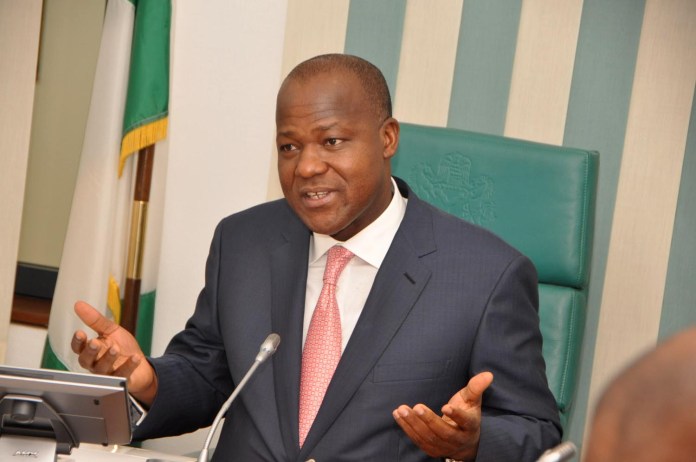- Dangote, Others Donate N300m at Dogara’s 50th Birthday Ceremony
Drama ensued on Tuesday when the Leader of the House of Representatives, Mr. Femi Gbajabiamila, challenged the Governor of Sokoto State, Mr. Aminu Tambuwal, to tell Nigerians the exact role he played in the emergence of his successor, Mr. Yakubu Dogara.
Gbajabiamila was speaking in Abuja at an event to mark Dogara’s 50th birthday and the unveiling of a book, titled, Dogara: A Real Made Flint.
Dogara had succeeded Tambuwal as the Speaker of the House on June 9, 2015.
He had defeated Gbajabiamila, the anointed All Progressives Congress’ candidate to win the speakership election, with only eight votes to the surprise of all.
It had been speculated that Tambuwal, who was very influential as speaker and later governor, worked against Gbajabiamila.
The Sokoto governor reportedly mobilised support for Dogara as soon as his bid to get Gbajabiamila to make some power-sharing compromises failed.
Findings indicated that before the poll, Tambuwal and Gbajabiamila were close friends.
Against all odds, Gbajabiamila, a Lagos lawyer, had worked for the emergence of Tambuwal as the speaker in 2011.
He was said to have naturally expected Tambuwal to return the favour in 2015, but he was reportedly disappointed when the governor supported Dogara instead.
Tambuwal and Dogara drifted apart in the aftermath of the election.
On Tuesday, when Gbajabiamila was asked to speak, he seized the opportunity to challenge Tambuwal to open up on his role by telling Nigerians the truth.
He stated, “Since the speakership contest, nobody can really say this is the role Tambuwal played. But, with this book, I believe we should be able to know. He has not been able to tell anybody the role he played.
“Maybe, he should be the one to tell us now. Nobody has been able to pin him (Tambuwal) down to state the role he played.”
There was general laughter at the venue as Gbajabiamila threw the challenge.
However, the governor merely joined others in laughing instead of speaking to the issue Gbajabiamila raised.
Meanwhile, over N300m was raised at the event on Tuesday. The amount is to be donated to charity, particularly internally displaced persons.
The President of Dangote Group, Aliko Dangote, led the donors with N100m.
Other major donors were by Capt. Idahosa Okunbo, N50m; and Chief Emeka Offor, N20m.
The governors of Bauchi, Sokoto, Zamfara, Kebbi, Edo and Borno states donated N10m each.
President Muhammadu Buhari, who was represented at the event by the Secretary to the Government of the Federation, Mr. Boss Mustapha, praised the Speaker for his role in dousing executive-legislature tensions.
In his response, Dogara assured the donors that the money realised at the event would be spent to improve the well-being of the IDPs and to fund charity.
Meanwhile, President Buhari on Tuesday congratulated Dogara on his 50th birthday.
In a statement by his Special Adviser on Media and Publicity, Mr. Femi Adesina, the President said having followed Dogara’s political trajectory; he believed that Nigeria’s future could be secured with great leadership by younger Nigerians.
Such youths, he added, should be fired with the zeal to build one great nation that everyone could call a home.
The President noted that Dogara’s personal attributes of selflessness, maturity and friendliness had eased the relationship between the Executive and the Legislative arms of government.


 Naira4 weeks ago
Naira4 weeks ago
 Naira4 weeks ago
Naira4 weeks ago
 Travel3 weeks ago
Travel3 weeks ago
 Jobs4 weeks ago
Jobs4 weeks ago
 Naira3 weeks ago
Naira3 weeks ago
 Naira3 weeks ago
Naira3 weeks ago
 Investment4 weeks ago
Investment4 weeks ago
 Travel4 weeks ago
Travel4 weeks ago



























